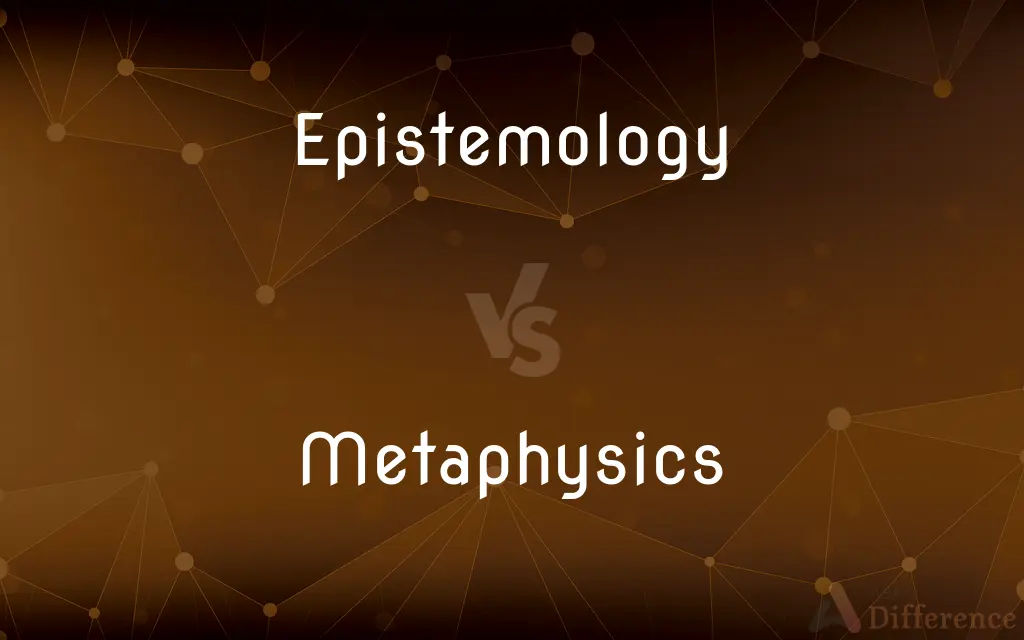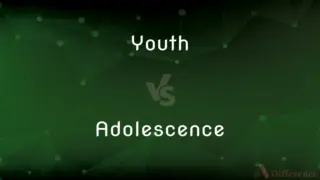Epistemology vs. Metaphysics — What's the Difference?
By Tayyaba Rehman & Maham Liaqat — Updated on March 20, 2024
Epistemology is the study of knowledge and how we come to know things, while metaphysics explores the nature of reality and existence.

Difference Between Epistemology and Metaphysics
Table of Contents
ADVERTISEMENT
Key Differences
Epistemology delves into questions about the nature, origin, and limits of human knowledge, addressing issues like justification, belief, and truth, whereas metaphysics investigates fundamental questions about what exists, including concepts like being, substance, cause and effect, and possibility.
While epistemology focuses on understanding how we can acquire knowledge and differentiate between justified belief and opinion, metaphysics is concerned with the underlying structure of reality, examining how things exist and relate to each other beyond the physical realm.
Epistemology often deals with the methods and validity of perception, reason, and testimony as sources of knowledge, examining the criteria for what constitutes knowledge, while metaphysics deals with more abstract questions such as whether abstract concepts like numbers or moral values have real existence.
The intersection of epistemology and metaphysics can be seen in debates about whether the nature of reality affects how we can know things, with some philosophical perspectives arguing that our understanding of metaphysical truths influences our epistemological views.
Comparison Chart
Focus
Study of knowledge and how we come to know things
Study of the nature of reality and existence
ADVERTISEMENT
Key Questions
What is knowledge? How do we acquire it? What justifies belief?
What exists? What is the nature of objects? What is causality?
Concerns
Nature, origin, and limits of human knowledge
Fundamental nature of being and the world
Examples
Sources of knowledge, theories of truth, concept of belief
Nature of time and space, possibility, identity, and change
Philosophical Concerns
How knowledge is acquired and validated
The underlying structure and principles of reality
Compare with Definitions
Epistemology
Examines the scope and nature of knowledge.
Epistemology questions how we can know anything with certainty.
Metaphysics
Explores the fundamental nature of reality.
Metaphysics asks what it means for something to exist.
Epistemology
Addresses the construction and validation of knowledge.
It considers empirical evidence and rational argument as bases for knowledge.
Metaphysics
Investigates the essence of objects, properties, and events.
It delves into the metaphysical status of universals and particulars.
Epistemology
Investigates the distinction between belief and true knowledge.
Epistemology explores how beliefs can be justified as knowledge.
Metaphysics
Engages with questions of possibility and necessity.
Metaphysics explores the nature of possible worlds and their relation to the actual world.
Epistemology
Reflects on skepticism and the possibility of knowledge.
Epistemological inquiries often engage with skeptical challenges to knowledge.
Metaphysics
Deals with the existence of abstract entities.
It questions whether numbers or moral values exist independently of human thought.
Epistemology
Concerned with the reliability of sources of knowledge.
It scrutinizes the credibility of sensory perception and logical reasoning.
Metaphysics
Considers the concepts of space, time, and matter.
Metaphysical studies examine whether time is absolute or relational.
Epistemology
Epistemology ( (listen); from Greek ἐπιστήμη, epistēmē 'knowledge', and -logy) is the branch of philosophy concerned with knowledge. Epistemologists study the nature, origin, and scope of knowledge, epistemic justification, the rationality of belief, and various related issues.
Metaphysics
Metaphysics is the branch of philosophy that studies the first principles of being, identity and change, space and time, causality, necessity and possibility. It includes questions about the nature of consciousness and the relationship between mind and matter.
Epistemology
The branch of philosophy that examines the nature of knowledge, its presuppositions and foundations, and its extent and validity.
Metaphysics
(used with a sing. verb) Philosophy The branch of philosophy that examines the nature of reality, including the relationship between mind and matter, substance and attribute, possibility and actuality.
Epistemology
(uncountable) The branch of philosophy dealing with the study of knowledge; theory of knowledge, asking such questions as "What is knowledge?", "How is knowledge acquired?", "What do people know?", "How do we know what we know?", "How do we know it is true?", and so on.
Some thinkers take the view that, beginning with the work of Descartes, epistemology began to replace metaphysics as the most important area of philosophy.
Metaphysics
(used with a pl. verb) The theoretical or first principles of a particular discipline
The metaphysics of law.
Epistemology
(countable) A particular instance, version, or school thereof; a particular theory of knowledge.
In his epistemology, Plato maintains that our knowledge of universal concepts is a kind of recollection.
Metaphysics
(used with a sing. verb) A priori speculation upon questions that are unanswerable to scientific observation, analysis, or experiment.
Epistemology
The theory or science of the method or grounds of knowledge.
Metaphysics
(used with a sing. verb) Excessively subtle or recondite reasoning.
Epistemology
The philosophical theory of knowledge
Metaphysics
The branch of philosophy which studies fundamental principles intended to describe or explain all that is, and which are not themselves explained by anything more fundamental; the study of first principles; the study of being insofar as it is being (Latin: ens in quantum ens).
Philosophers sometimes say that metaphysics is the study of the ultimate nature of the universe.
Metaphysics
The view or theory of a particular philosopher or school of thinkers concerning the first principles which describe or explain all that is.
The metaphysics of Thomas Aquinas holds that all real beings have both essence and existence.
In Aristotelian metaphysics physical objects have both form and matter.
In his Pensées, Pascal mentioned some first principles recognized within his metaphysics: space, time, motion, and number.
Metaphysics
The metalogic of physics; the logical framework of physics.
Even other universes should be a result of different physics. Without rules, these universes wouldn't exist, because they will have an undefined, thus impossible, nature. We will never understand or guess all possible forms of physics. That's why we have to understand the generic metaphysics.
Metaphysics
Any fundamental principles or rules.
Metaphysics
(uncountable) The study of a supersensual realm or of phenomena which transcend the physical world.
I have a collection of books on metaphysics, covering astral projection, reincarnation, and communication with spirits.
Metaphysics
Displeasingly abstruse, complex material on any subject.
This political polemic strikes me as a protracted piece of overwrought, fog-shrouded metaphysics!
Metaphysics
Plural of metaphysic
Metaphysics
The science of real as distinguished from phenomenal being; ontology; also, the science of being, with reference to its abstract and universal conditions, as distinguished from the science of determined or concrete being; the science of the conceptions and relations which are necessarily implied as true of every kind of being; philosophy in general; first principles, or the science of first principles.
Commonly, in the schools, called metaphysics, as being part of the philosophy of Aristotle, which hath that for title; but it is in another sense: for there it signifieth as much as "books written or placed after his natural philosophy." But the schools take them for "books of supernatural philosophy;" for the word metaphysic will bear both these senses.
Now the science conversant about all such inferences of unknown being from its known manifestations, is called ontology, or metaphysics proper.
Metaphysics are [is] the science which determines what can and what can not be known of being, and the laws of being, a priori.
Metaphysics
The scientific knowledge of mental phenomena; mental philosophy; psychology.
Metaphysics, in whatever latitude the term be taken, is a science or complement of sciences exclusively occupied with mind.
Whether, after all,A larger metaphysics might not helpOur physics.
Metaphysics
The philosophical study of being and knowing
Common Curiosities
Is morality a subject of epistemology or metaphysics?
Morality is addressed by both epistemology, in terms of how we know what is right or wrong, and metaphysics, in terms of the nature and existence of moral values and laws.
Can metaphysics exist without epistemology?
While metaphysics can be studied independently of epistemology, questions about how we know or understand metaphysical claims often bring epistemological considerations into play.
How do epistemology and metaphysics interact?
Epistemology and metaphysics interact when considering how our understanding of reality (a metaphysical issue) influences what we can know and how we know it (epistemological issues).
What is epistemology in simple terms?
Epistemology is the branch of philosophy that studies how we acquire knowledge, what counts as knowledge, and what limits there might be to our knowing.
How does metaphysics impact our daily lives?
While metaphysics might seem abstract, it impacts our daily lives by shaping our understanding of reality, influencing our beliefs about free will, personal identity, and the nature of the universe, which in turn affect our choices and actions.
How does one study epistemology or metaphysics?
Studying epistemology or metaphysics involves engaging with philosophical texts, arguments, and debates, often through academic courses, reading, discussion, and writing in philosophy.
What does metaphysics cover?
Metaphysics covers the foundational questions about the nature of reality, including the study of existence, objects and their properties, space and time, cause and effect, and possibility.
What are some practical applications of epistemology?
Epistemology has practical applications in areas such as science (understanding the nature and limits of scientific knowledge), education (how we teach and learn), and information theory (how information is quantified and understood).
What are the major debates in epistemology?
Major debates in epistemology include the nature of justification, the structure of knowledge, the sources of knowledge, and the challenge of skepticism.
What are some key concepts in metaphysics?
Key concepts in metaphysics include being and existence, objects and their properties, space and time, causality, and the nature of change.
Share Your Discovery

Previous Comparison
Youth vs. Adolescence
Next Comparison
Indiegogo vs. KickstarterAuthor Spotlight
Written by
Tayyaba RehmanTayyaba Rehman is a distinguished writer, currently serving as a primary contributor to askdifference.com. As a researcher in semantics and etymology, Tayyaba's passion for the complexity of languages and their distinctions has found a perfect home on the platform. Tayyaba delves into the intricacies of language, distinguishing between commonly confused words and phrases, thereby providing clarity for readers worldwide.
Co-written by
Maham Liaqat













































